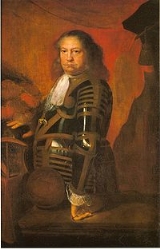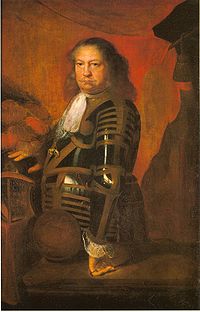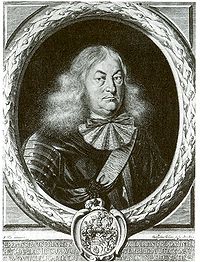
Eberhard III, Duke of Württemberg
Encyclopedia
Eberhard III, Duke of Württemberg (16 December 1614 Stuttgart
– 2 July 1674 Stuttgart) ruled as Duke of Württemberg
from 1628 until his death in 1674.
 Eberhard III became the heir under guardianship in 1628 during the Thirty Years War at the age of 14 after the death of his father, Johann Frederick, 7th Duke of Württemberg
Eberhard III became the heir under guardianship in 1628 during the Thirty Years War at the age of 14 after the death of his father, Johann Frederick, 7th Duke of Württemberg
. His guardian at first was his father's brother Ludwig Frederick of Württemberg-Mömpelgard and after his death in 1631 Julius Frederick of Württemberg-Weiltingen.
Württemberg lost around one third of its territory in 1629. Julius Frederick was removed as guardian in 1633 when Eberhard was declared of full age at which point he assumed full rule of the Duchy. Following a major defeat of Württemberg troops in the battle of Nördlingen
on 6 September 1634, Württemberg was severely looted and plundered.
Eberhard fled to Strasbourg
where he married in 1637, returning to Württemberg in 1638 after long negotiations with Ferdinand III of the Holy Roman Empire
. By this time many territories had already been passed on by the Emperor to other parties to push forward Catholicism in the region.
The Duchy of Württemberg was reinstated after long negotiations resulting in the Peace of Westphalia
of 1648, despite or maybe because of the effects of war, poverty, hunger and the Bubonic plague
all of which reduced the population from 350,000 in 1618 to 120,000 in 1648.
Eberhard III entered into an inheritance agreement with his younger brother Frederick thereby handing over ownership of the Duchy of Württemberg-Neuenstadt
and thus establishing a new branch line of the duchy. In 1651, Eberhard came to a similar agreement with another brother, Ulrich affecting the Castle of Neuenbürg
.
 Eberhard III was the second son of John Frederick, 7th Duke of Württemberg and Barbara Sophie of Brandenburg
Eberhard III was the second son of John Frederick, 7th Duke of Württemberg and Barbara Sophie of Brandenburg
. He married twice, first on 26 February 1637 with Anna Katharina, Wild- and Rheingräfin of Salm-Kyrburg (27 January 1614 – 27 June 1655). They had the following children:
Secondly, he married on 20 July 1656 with Countess Marie Dorothea Sofie of Oettingen (29 December 1639 – 29 June 1698). They had the following children:
Stuttgart
Stuttgart is the capital of the state of Baden-Württemberg in southern Germany. The sixth-largest city in Germany, Stuttgart has a population of 600,038 while the metropolitan area has a population of 5.3 million ....
– 2 July 1674 Stuttgart) ruled as Duke of Württemberg
Württemberg
Württemberg , formerly known as Wirtemberg or Wurtemberg, is an area and a former state in southwestern Germany, including parts of the regions Swabia and Franconia....
from 1628 until his death in 1674.

Johann Frederick, Duke of Württemberg
Duke John Frederick of Württemberg was the 7th Duke of Württemberg from 4 February 1608 until his death on 18 July 1628 whilst en route to Heidenheim.- Life :...
. His guardian at first was his father's brother Ludwig Frederick of Württemberg-Mömpelgard and after his death in 1631 Julius Frederick of Württemberg-Weiltingen.
Württemberg lost around one third of its territory in 1629. Julius Frederick was removed as guardian in 1633 when Eberhard was declared of full age at which point he assumed full rule of the Duchy. Following a major defeat of Württemberg troops in the battle of Nördlingen
Battle of Nördlingen (1634)
The Battle of Nördlingen was fought on 27 August or 6 September , 1634 during the Thirty Years' War. The Roman Catholic Imperial army, bolstered by 18,000 Spanish and Italian soldiers, won a crushing victory over the combined Protestant armies of Sweden and their German-Protestant allies .After...
on 6 September 1634, Württemberg was severely looted and plundered.
Eberhard fled to Strasbourg
Strasbourg
Strasbourg is the capital and principal city of the Alsace region in eastern France and is the official seat of the European Parliament. Located close to the border with Germany, it is the capital of the Bas-Rhin département. The city and the region of Alsace are historically German-speaking,...
where he married in 1637, returning to Württemberg in 1638 after long negotiations with Ferdinand III of the Holy Roman Empire
Ferdinand III, Holy Roman Emperor
Ferdinand III was Holy Roman Emperor from 15 February 1637 until his death, as well as King of Hungary and Croatia, King of Bohemia and Archduke of Austria.-Life:...
. By this time many territories had already been passed on by the Emperor to other parties to push forward Catholicism in the region.
The Duchy of Württemberg was reinstated after long negotiations resulting in the Peace of Westphalia
Peace of Westphalia
The Peace of Westphalia was a series of peace treaties signed between May and October of 1648 in Osnabrück and Münster. These treaties ended the Thirty Years' War in the Holy Roman Empire, and the Eighty Years' War between Spain and the Dutch Republic, with Spain formally recognizing the...
of 1648, despite or maybe because of the effects of war, poverty, hunger and the Bubonic plague
Bubonic plague
Plague is a deadly infectious disease that is caused by the enterobacteria Yersinia pestis, named after the French-Swiss bacteriologist Alexandre Yersin. Primarily carried by rodents and spread to humans via fleas, the disease is notorious throughout history, due to the unrivaled scale of death...
all of which reduced the population from 350,000 in 1618 to 120,000 in 1648.
Eberhard III entered into an inheritance agreement with his younger brother Frederick thereby handing over ownership of the Duchy of Württemberg-Neuenstadt
Württemberg-Neuenstadt
Württemberg-Neuenstadt was the name of two branch lines of the ducal House of Württemberg in the 17th and 18th century. It was named after the town of residence, Neuenstadt.- First branch line :...
and thus establishing a new branch line of the duchy. In 1651, Eberhard came to a similar agreement with another brother, Ulrich affecting the Castle of Neuenbürg
Neuenbürg
Neuenbürg is a town in the Enz district, in Baden-Württemberg, Germany. It is situated on the river Enz, 10 km southwest of Pforzheim.The town has three stops, Neuenbürg, Neuenbürg Süd and Neuenbürg Freibad, on route S6 of the Karlsruhe Stadtbahn, which operates over the Enztalbahn railway....
.
Family and children

Barbara Sophie of Brandenburg
Barbara Sophia of Brandenburg was the daughter of the Catherine of Küstrin and Elector of Joachim Frederick of Brandenburg...
. He married twice, first on 26 February 1637 with Anna Katharina, Wild- and Rheingräfin of Salm-Kyrburg (27 January 1614 – 27 June 1655). They had the following children:
- John Frederick (9 September 1637 – 2 August 1659)
- Louis Frederick (2 November 1638 – 18 January 1639)
- Christian Eberhard (29 November 1639 – 23 March 1640)
- Eberhard (12 December 1640 – 24 February 1641)
- Sofie Luise (19 February 1642 – 3 October 1702), married 8 February 1671 to Christian Ernst, Margrave of Brandenburg-BayreuthChristian Ernst, Margrave of Brandenburg-BayreuthChristian Ernst of Brandenburg-Bayreuth was a member of the House of Hohenzollern and Margrave of Brandenburg-Bayreuth....
- Dorothea Amalie (13 February 1643 – 27 March 1650)
- Christine Friederike (1644 – 1674), married in 1665 to Count Albert Ernest I of Oettingen-Oettingen
- Christine CharlotteChristine Charlotte of WürttembergChristine Charlotte of Württemberg was a princess of Württemberg by birth and a princess consort of East Frisia, married in 1662 to George Christian, Prince of East Frisia. She served as the regent of East Frisia during the minority of her son from 1665 until 1690...
(21 October 1645 – 16 May 1699), married in May 1662 to Prince George Christian, Prince of East FrisiaGeorge Christian, Prince of East FrisiaGeorge Christian was a member of the Cirksena family and succeeded his brother Enno Louis as ruler of East Frisia. He ruled from 1660 to 1665. Under his reign, the Cirksena family acquired on 18 April 1662 the hereditary title of Imperial Prince.George Christian grew up with his brother at the... - Duke William Louis of Württemberg (7 January 1647 – 23 June 1677)
- Anna Katharine (27 November 1648 – 10 November 1691)
- Karl Christof, born and died in 1650
- Eberhardine Katharine (12 April 1651 – 19 August 1683), married on 30 April 1682 to Count Albert Ernest I of Oettingen-Oettingen
- Duke Frederick Charles of Württemberg-WinnentalFrederick Charles of Württemberg-WinnentalFrederick Charles of Württemberg-Winnental was since 1677 Duke of the new-founded line of Württemberg-Winnental and regent of the infant Duke Eberhard Ludwig.-Biography:...
(September 1652 – December 1698) - Karl Maximilian (28 September 1654 – 9 January 1689)
Secondly, he married on 20 July 1656 with Countess Marie Dorothea Sofie of Oettingen (29 December 1639 – 29 June 1698). They had the following children:
- George Frederick (24 September 1657 – 18 October 1685)
- Albrecht Christian (13 June 1660 – 20 January 1663)
- Louis (14 August 1661 – 30 November 1698)
- Joachim Ernst (28 August 1662 – 16 February 1663)
- Philipp Siegmund (6 October 1663 – 23 July 1669)
- Karl Ferdinand (13 October 1667 – 13 June 1668)
- John Frederick (10 June 1669 – 15 October 1693)
- Eberhard, born and died in 1672
- Emanuel Eberhard (11 October 1674 – 1 July 1675)

